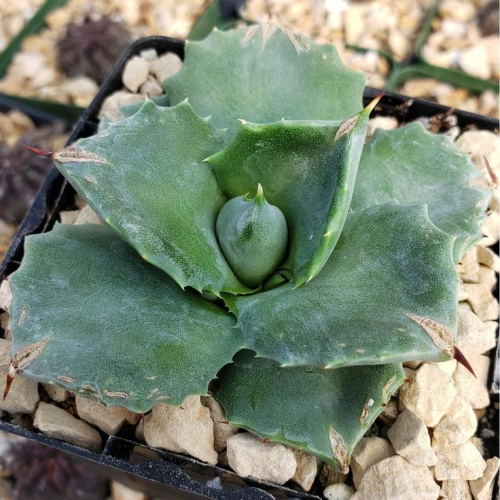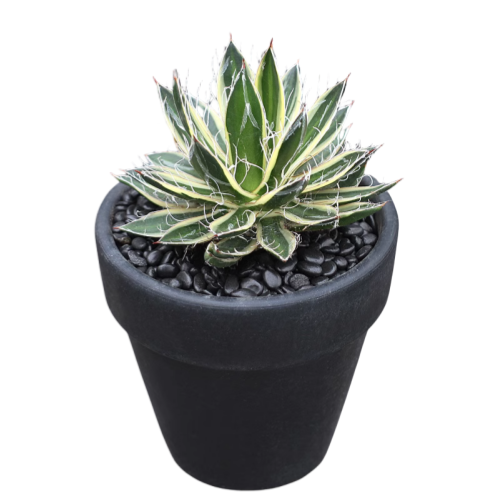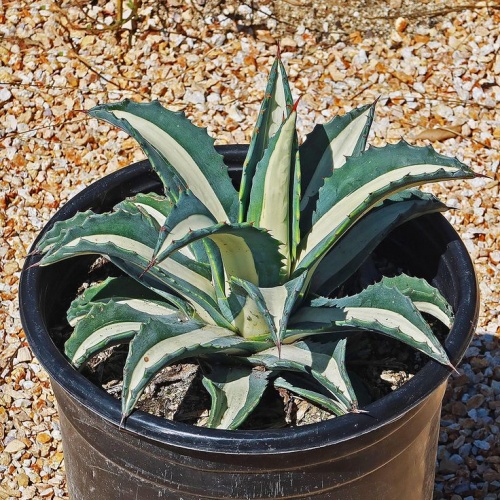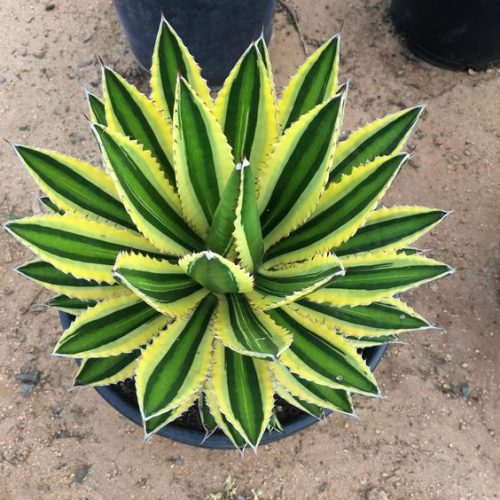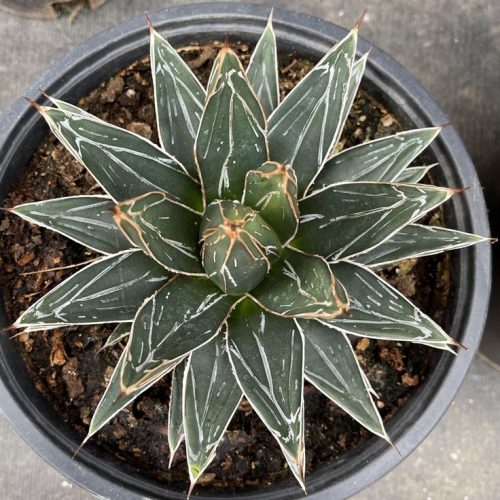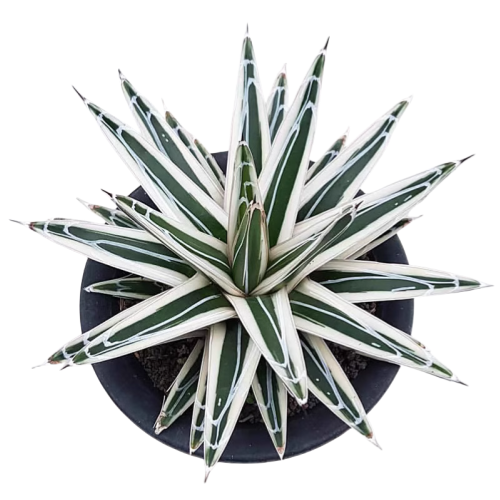Agave Horrida
- Magaca Botanical: Agave Horrida
- Magaca Qoyska: Asparagoaeeae
- Jirdhiska: 1-3 cagood
- Heerkulka: -3.9 °C ~ 10 °C
- Kuwo kale: Sida qoraxda, abaarta u adkaysata, waxay u baahan tahay biyo-mareen wanaagsan.
Kudbad gaaban
Sharraxaadda Wax soo saarka
Agave horrida: The Regal Thorn - Joogitaanka amar ee boqortooyooyinka Arid
Bandhiga Prickly: Sheekada Cagaaran iyo Cagaaran ee Agave horrida
Agave Horrida, xubin xubin ka ah Asparagoaeeae qoyska (sidoo kale loo yaqaan Agavaceae), waxay u taagan tahay cabbir dhexdhexaad ah, rosette simmetrical ah. Caleemaha geedkan waa cagaar qoto dheer, oo ay ka buuxaan cufan cufan oo laf-dhabarta fiiqan iyo soo rogaya laf dhabarta, abuurista muuqaal muuqaal ah iyo joogitaanka xoogaa cabsi leh.
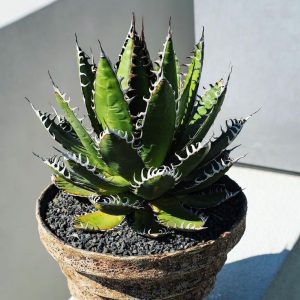
Agave Horrida
Caleenta caleenta
Baaluq Agave Horrida dhirta waxaa lagu qurxiyaa 80 ilaa 100 caleemood, mid walbana wuxuu dhererkiisu yahay 18 ilaa 35 sentimitir, ballaciisuna 4 ilaa 7 sentimitir salka. Caleemahani waxay gacan ka geystaan dhererka guud ee geedka, kaas oo gaara dhererka 30 ilaa 60 sentimitir wuxuuna dhererkiisu yahay 45 ilaa 90 sentimitir.
Daqiiqadii Agave Hida
Wareegga nolosha ee Agave Horrida waxay ku dhammaatay dhacdo ubaxeed oo cajiib ah. Warshadu waxay kor u qaadaa jirid ubax ah oo aad u dheer, oo gaadhaysa dhererka 2 ilaa 2.5 mitir, ka hor inta aysan dhammaan rosettesku dhamaystirin safarkeeda daaqsinka ah oo leh final cajiib ah. Xilligan ubaxu maaha oo kaliya dhacdo dhirta laakiin waa muuqaal dabiici ah oo calaamad u ah dhammaadka wareegga koritaanka geedka.
Agave Horrida: The Cends Common Cendinel
Asal ahaan asal ahaan juqraafi ahaan
Waxay ka soo baxday qalbiga Meksiko, gaar ahaan gobollada Morelos, Queretaro, iyo San Luis Postosí. Waxay ku korinaysaa kor u qaadida inta u dhexeysa 6,900 iyo 7,800 cagood (2100 illaa 2300 mitir), halkaas oo ay ka hesho nichhe oo ka dhex jira dhagaxa dhagaxa iyo beeraha lava.
Dulqaadashada cimilada
Agave horrida's Climate Command" Noocani waa ka qabow-adkeysi yar laakiin aad u dulqaad badan kulaylka, hoos hoos USDA Hardiness Zone 9b, adkeysi hoose ee -3.9°C
Xiriirka iftiinka qoraxda
Sida warshad fudud-jecel, waxay ku soo foodsaaray qorraxda oo dhan ilaa qayb ka mid ah xaaladaha hooska qayb ahaan, oo tamar ka soo qaad qorraxda si ay u awood u yeeshaan koritaankeeda oo ay u ilaaliso heesaha cagaaran ee firfircoon.
Carrada iyo dheecaanka
Sarraynta Ciidda” Si loo helo korriin wanaagsan, waxa ay u baahan tahay carro si fiican u miiray si ay uga hortagto in biyuhu gooyaan, taas oo keeni karta in ay qudhunto xididdadu, door biddeeda ciidda si fiican u miiray waxa ay hubisaa in ay cimilada qoyan tahay iyada oo aan ku dhicin culayska biyaha la xidhiidha.
Abaarta adkeysiga
Agave horrida’s Drought Defiance” Maadaama ay tahay mid aad u wanaagsan oo la qabsatay xaaladaha qalalan, waxa ay muujisaa dulqaad abaareed oo cajiib ah.Waxay ku badhaadhaa deegaan leh iftiin cadceed ku filan iyo ciid si fiican u miiraysa, una baahan biyo yar si ay u ilaaliso caafimaadkeeda iyo dhismaheeda adag.
Sidee u ilaaliyaa Agave Corrida caafimaad qabta
Istaraatiijiyadda Qorraxda iyo Baargalka ee Xagaaga
Daryeelka Xagaaga ee Agave horrida "In kasta oo ay ku koraan iftiinka qorraxda, waxaa muhiim ah in laga ilaaliyo qallafsanaanta, fallaadhaha tooska ah ee qorraxda xagaaga, gaar ahaan noocyada kala duwan ee u nugul gubashada caleenta. Inta lagu jiro xilliga koritaanka firfircoon ee May ilaa Oktoobar, bacriminta dheellitiran, si tartiib tartiib ah ayaa loo isticmaali karaa laba bilood kasta si loo taageero koritaanka xilliga jiilaalka, laakiin la joojiyo xilliga jiilaalka.
Farsamooyinka ku-tallaalidda: Daryeelka xididka iyo heerka carrada
Farshaxanka ku-tallaalidda Agave horrida" beerista waxay u baahan tahay taabasho jilicsan si loo ilaaliyo daacadnimada nidaamka xididkeeda. Waa muhiim in lagu beero agave qoorteeda xariiqda ciidda, iyada oo laga fogaanayo aaska qoto dheer ee u horseedi kara qudhun iyo korriin.
Akhlaaqda deegaanka: ka ilaaliya xag-jirnimada
Ka ilaalinta Agave horrida ee xaaladaha adag” waa in la geliyo meel ka fogaanaysa in si toos ah ay hawada u qaboojiyaan iyo roobka xad dhaafka ah, gaar ahaan marka lagu beero dhulka.





